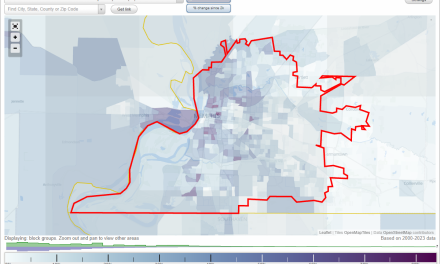From Atlantic Cities:
It’s September, which for many of us is synonymous with heading back to school or back to work. And for many newly minted college graduates, it means revving up their job search.
For grads who weren’t fortunate enough to have a job waiting for them immediately after getting their diplomas, the first post-college summer might consist of completing an internship, or for the even more fortunate, a time to rest and relax or maybe travel a bit before entering the real world. This year, the number of young and educated Millennials looking for jobs could swell even further — fewer 22 year-olds are turning to grad school as a way to wait out the weak job market. Joining them in the feverish job hunt will be the slightly older and now even more qualified cohort who entered grad school in 2009 and 2010.
So now is a good time to ask: What are the best places for recent grads looking to enter the job market?
To find out, I turned to the economic and labor market data firm EMSI to chart job openings in fields that require post-secondary education (from vocational certificate programs to doctoral degrees) and are in fields which have grown by 2 percent or more in 2013. My MPI colleague Zara Matheson mapped the data.
Across the nation’s 50 largest metro areas, there were 15.8 million jobs in these fast-growing, highly educated fields as of 2013. Between 2012 and 2013, about 375,000 such jobs were created across the country, and EMSI estimates there will be as many as 670,000 job openings in 2013, taking into account newly created jobs and openings created from turnover and retirement. These jobs, in fields from welders and paralegals to computer programmers and biochemists, offered median hourly earnings of $32.85 in America’s 50 largest metros.

The first map, above, ranks the largest 50 U.S. metros based on EMSI’s estimate of 2013 job openings (including new jobs and turnover) for recent college grads. New York leads with more than 66,000 openings, roughly ten percent of the total. L.A. is second with 39,508. That makes sense: N.Y. and L.A. are America’s two largest metros. Together, they in fact account for nearly 3 million of these positions, nearly one in five of these estimated fast-growing, highly-educated jobs across the nation.
Once we look beyond these two largest metros, the pattern diverges a bit from the size of a metro’s population. Greater Washington, D.C., has the third largest number of estimated openings, 39,259. Dallas-Fort Worth is fourth with 30,038, and Boston fifth with 29,156. Chicago (28,933), Houston (28,615), Philadelphia (21,054) and Seattle (20,320) all are projected to have between 20,000 and 30,000 job openings for highly educated workers in fast-growing fields in 2013. San Francisco, Atlanta, Phoenix, Miami and the Twin Cities of Minneapolis-St. Paul are projected to have between 15,000 and 20,000 total job openings each in these fields this year.

But looking at total job openings favors large metros with more people and more jobs. The map above controls for this by using a metric called a “location quotient,” or LQ for short, which shows a metro’s current concentration of these fast-growing, educated jobs relative to the national average. An LQ of 1 is a metro’s expected national share, while an LQ of less than one indicates a share lower than expected, and an LQ greater than 1 reflects a higher than expected share. The table below show the top ten major metros areas for recent college grads based on their LQs for jobs in these booming, highly educated fields.
| Best Metros for Recent College Grads | ||||
| Rank | Metro | LQ for Jobs | Estimated 2013 Job Openings | Median Hourly Earnings |
| 1 | San Jose-Sunnyvale-Santa Clara, CA | 1.55 | 9,927 | $47.27 |
| 2 | Washington-Arlington-Alexandria, DC-VA-MD-WV | 1.36 | 39,259 | $40.46 |
| 3 | Boston-Cambridge-Quincy, MA-NH | 1.34 | 29,156 | $36.19 |
| 4 | Seattle-Tacoma-Bellevue, WA | 1.27 | 20,320 | $36.73 |
| 5 | San Francisco-Oakland-Fremont, CA | 1.24 | 19,981 | $40.69 |
| 6 | Raleigh-Cary, NC | 1.19 | 6,672 | $30.42 |
| 7 | Austin-Round Rock-San Marcos, TX | 1.18 | 9,960 | $31.87 |
| 8 | Hartford-West Hartford-East Hartford, CT | 1.17 | 5,039 | $32.45 |
| 9 | Detroit-Warren-Livonia, MI | 1.16 | 12,653 | $30.81 |
| 9 | Baltimore-Towson, MD | 1.16 | 14,228 | $32.15 |
Now, the picture changes. The San Jose metro vaults into the top spot. With its tech companies and reputation as one of America’s preeminent knowledge centers, the metro that comprises Silicon Valley has an LQ of 1.55 for jobs in growing, highly educated fields.
The greater Washington, D.C. metro is second, with an LQ of 1.36 and median hourly earnings of $40.46. Boston-Cambridge, Seattle, and San Francisco-Oakland-Fremont (including the city of Berkeley) round out the top five, followed by Raleigh-Cary in North Carolina’s Research Triangle and Austin, Texas. Each of the top seven is a noted high-tech, knowledge economy hub.
The remainder of the top ten are more interesting. Rounding out the bunch are Hartford, Connecticut, as well as hard-hit Detroit, Michigan, and Baltimore, Maryland. It is especially encouraging to see Detroit among the nation’s leaders in job openings for talented young people. This suggests that efforts from the local business community to remake its downtown may have real legs. Philadelphia, Richmond, Minneapolis-St. Paul, Cleveland, Columbus, Pittsburgh, Cincinnati, St. Louis, and Kansas City all number among the top twenty best metros for recent college grads seeking work, using proportional levels of job availability as a metric.
Several places that rank highly in terms of the absolute number of job openings for college grads now fall much lower on the list. New York ranks 23rd (with an LQ of 1.06), while Los Angeles is 33rd (with an LQ of just 1.01). Chicago is 38th (with an LQ of .98). Sunbelt boomtowns fall lower on the list as well. Dallas and Houston tie for 28th, Atlanta is 31st and Phoenix ties L.A. for 33rd.
The metros where recent college grads are less likely to find work (based on the concentration of skilled jobs in growing fields) are largely centered in the West and the Sunbelt. At the very bottom of the list is Las Vegas (with an LQ of 0.68), with its large concentration of low-skilled service work. Following Vegas are Riverside, California (0.80); Memphis (0.87); New Orleans (0.89); San Antonio (0.91); and Orlando (0.91).

The third map charts the median hourly earnings offered for these fast-growing, highly educated jobs. San Jose again tops the list (by a considerable margin) with a median hourly wage of $47.27. Neighboring San Francisco is second with $40.69, and greater Washington, D.C., is third with wages of $40.46. Seattle, New York, Boston, and Sacramento offer wages between $35 and $37 per hour. Houston, Los Angeles, and San Diego are the only other metros that offer wages above the large metro median of $32.85.
Nearly half of the 50 largest metros offer median wages lower than $30 per hour. The metros that offer the lowest wages for fast-growing highly educated jobs include Virginia Beach ($26.29), Memphis ($26.72), Oklahoma City ($26.84), Birmingham ($27.05), Orlando ($27.09), Buffalo ($27.17), Nashville ($27.21), Miami ($27.23), Louisville ($27.30), and New Orleans ($27.39).
Metros like San Francisco, D.C., Boston, L.A., and New York have long been seen as among the best places for recent grads. And some of them — the Bay Area, Greater D.C., Boston, Seattle, etc. — continue to perform well according to these most recent figures. But others may not be as promising as they once were for college grads, including the nation’s big three metros — New York, LA., and Chicago — along with Sunbelt havens like Phoenix and Dallas.
The good news is that Rustbelt metros like Detroit, Pittsburgh, and Cleveland appear to have turned the corner. These metros have a lot to offer highly educated recent grads: affordable housing, a low cost of living, authentic neighborhoods, and revitalizing cores, as well as a relatively high level of job openings for in fast-growing highly-educated fields. Metros many young and educated twenty-somethings have largely written off deserve a closer look from those seeking work in today’s recovering but still tough job market.



